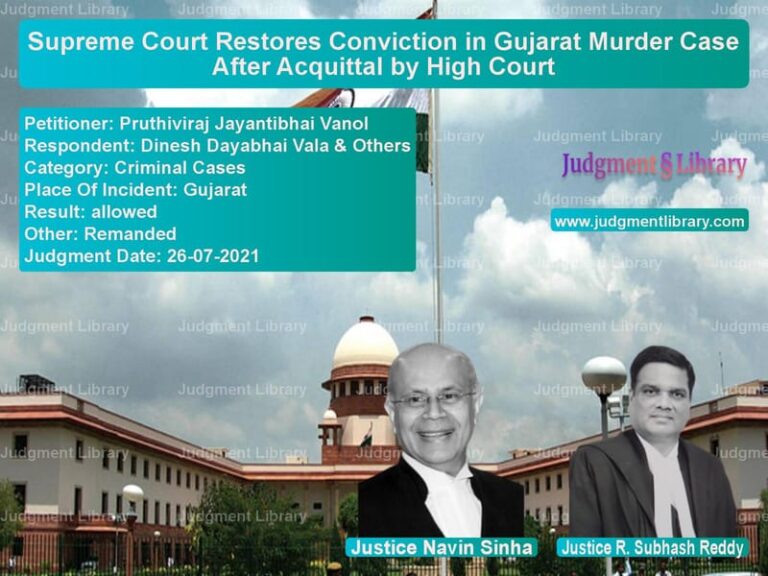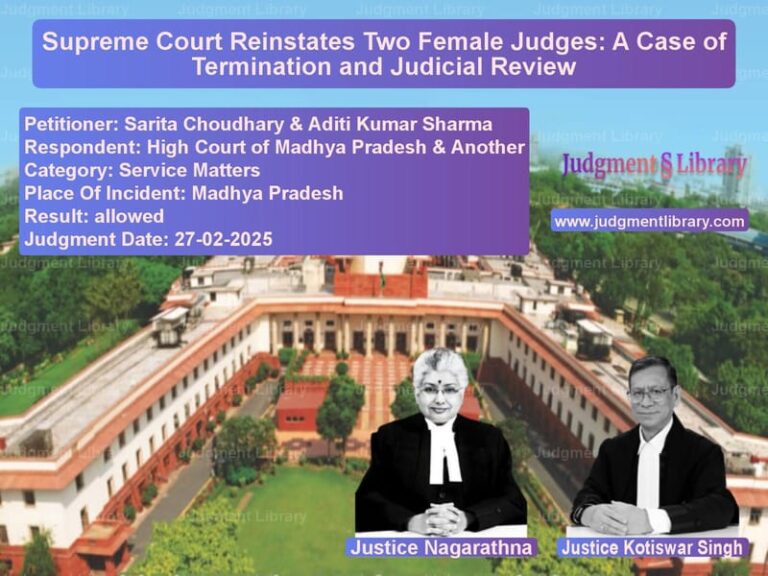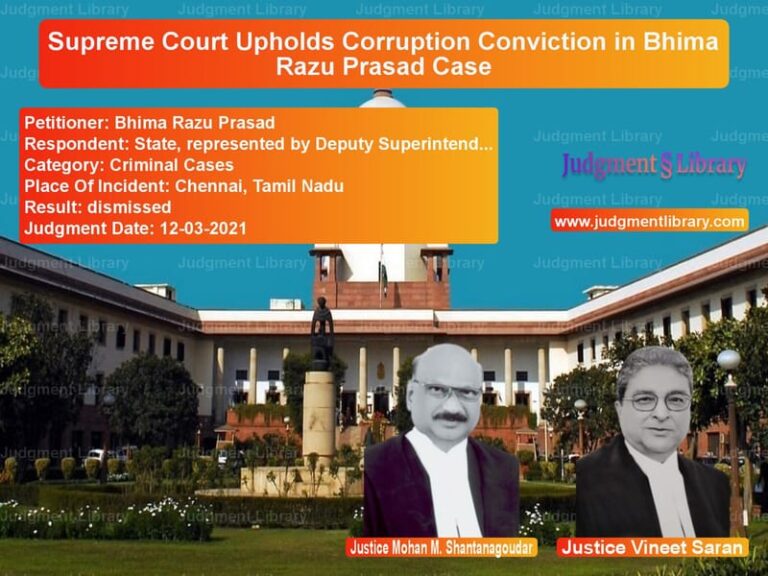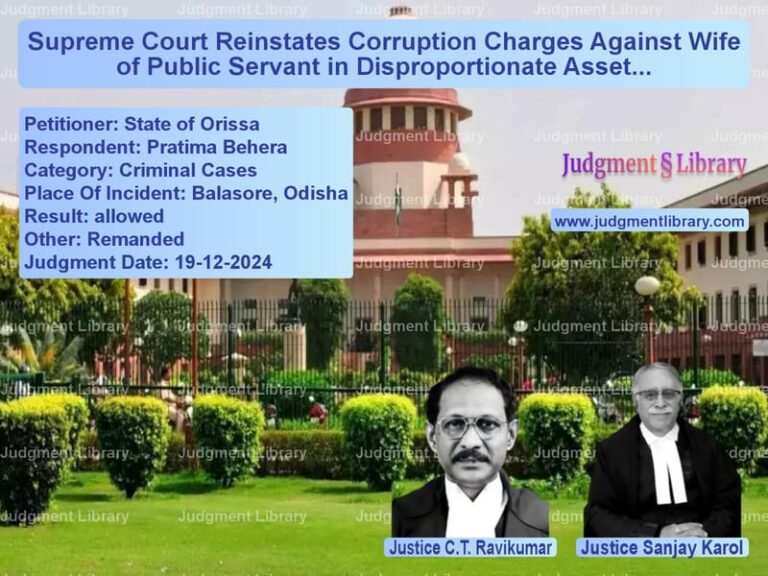Supreme Court Upholds Sale of Parsi Trust Property in Madhya Pradesh
The case of Parsi Zoroastrian Anjuman, Mhow v. The Sub-Divisional Officer & The Registrar of Public Trusts involves a dispute regarding the sale of trust property owned by the Parsi Zoroastrian Anjuman in Mhow, Madhya Pradesh. The Supreme Court ruled in favor of the trust, overturning the decisions of the Madhya Pradesh High Court and the Registrar of Public Trusts, which had previously denied the trust permission to sell its properties.
Background of the Case
The appellant, Parsi Zoroastrian Anjuman, Mhow, is a registered public trust under the Madhya Pradesh Public Trusts Act, 1951. The trust was established to manage community properties and funds for the welfare of Parsi Zoroastrians in Mhow. Over time, the trust faced financial difficulties due to increasing expenses and limited income.
On May 15, 2011, the District Judge, Mhow, approved a revised scheme for the trust. This scheme allowed the Managing Committee to liquidate vacant assets and use the proceeds for community welfare, including:
- Maintaining the consecrated holy fire in the Mhow Agiari (fire temple).
- Supporting a resident priest.
- Providing financial aid to needy members of the Parsi community.
On December 14, 2014, the Managing Committee unanimously decided to sell five properties, a decision later ratified by a majority of trust members in a general body meeting on January 19, 2015. A “Vision Document” was circulated, outlining how the proceeds would be invested and utilized for trust objectives.
Application for Sale Approval
As required under Section 14 of the Madhya Pradesh Public Trusts Act, 1951, the trust sought prior sanction from the Registrar of Public Trusts to sell the properties. The application emphasized:
- The properties were in a dilapidated condition and required extensive repairs.
- Tenants were paying nominal rent, generating insufficient income.
- Trust expenses had risen to ₹26 lakhs per annum, exceeding its income.
- The sale proceeds would be invested in approved schemes to generate sustainable income for community welfare.
Objections and Registrar’s Decision
The application faced opposition from Pervin Rumi Jehangir, a member of the trust, who objected to the sale. She argued that selling heritage properties would harm the trust’s long-term interests. The Registrar rejected the application on November 10, 2017, citing:
- Frequent past sales of trust properties.
- Concerns that continued sales would exhaust all trust assets.
- The need for expert financial advice to explore alternative ways to reduce expenses.
- A lack of solid evidence proving the poor condition of the properties.
Legal Challenge in High Court
The trust challenged the Registrar’s decision in the Madhya Pradesh High Court, arguing that the sale was essential for financial stability and had been approved by a majority of trust members. However, both the Single Judge and Division Bench upheld the Registrar’s decision.
The High Court, citing the Supreme Court judgment in Cyrus Rustom Patel v. Charity Commissioner, ruled that the trust had not made adequate efforts to repair its buildings and preserve Parsi cultural heritage. It emphasized that trust properties should not be sold at “throwaway prices” and dismissed the petition.
Arguments of the Appellant (Trust)
- The Registrar’s role under Section 14 was limited and did not allow discretionary rejection of the application.
- The trust’s Vision Document clearly outlined how sale proceeds would be used for community welfare.
- The proposed sale followed a transparent process involving valuation and public bidding.
- The High Court failed to recognize that past sales were also for financial sustainability.
Arguments of the Respondents (Registrar & Objector)
- The Registrar had the authority to protect trust assets from unjustified sales.
- The trust had not provided sufficient details on alternative income sources.
- The decision to sell properties was allegedly influenced by a few Managing Committee members.
Key Observations of the Supreme Court
1. Limited Powers of the Registrar
The Supreme Court emphasized that the Registrar’s authority under Section 14 was limited to ensuring compliance with the trust deed and court orders. It ruled:
“The Registrar’s power is not supervisory but administrative. It cannot extend to imposing subjective views on what constitutes the best interests of the trust.”
2. Autonomy of Trust Decision-Making
The Court reaffirmed that self-governing trusts must have autonomy in financial decisions, provided they act transparently and in accordance with legal provisions.
“A democratically governed trust cannot be subjected to overarching state control when its decisions are taken through a well-informed and transparent process.”
3. Importance of Financial Planning
The Court found that the trust had prepared a comprehensive financial plan:
“The Vision Document provides a clear strategy for sustaining the trust’s objectives through prudent investments.”
4. Transparency in the Sale Process
The Court noted that the sale process included valuation and a public bidding mechanism:
“Public auction or tender ensures fair pricing, removing any doubts about misuse of trust assets.”
5. Need for Fresh Property Valuation
While allowing the sale, the Court directed that the properties should be re-evaluated before proceeding:
“The trust may proceed with the sale but must obtain fresh valuation reports and ensure transparency in the bidding process.”
Final Judgment
The Supreme Court ruled in favor of the trust and issued the following directions:
- The High Court’s decision upholding the Registrar’s rejection is quashed.
- The Registrar is directed to approve the sale subject to fresh valuation and bidding.
- The trust must ensure transparency in the sale process.
Significance of the Judgment
This ruling establishes key legal principles regarding the management of trust properties:
- Trusts must have autonomy in financial decisions, provided they follow due process.
- The Registrar’s role is administrative, not supervisory; it cannot impose subjective opinions on trust management.
- Public trusts can sell assets to sustain operations if done transparently and in line with legal guidelines.
- Financial planning and community consultation play a crucial role in trust property management.
This judgment provides a significant precedent for trusts seeking to sell assets for financial sustainability while ensuring compliance with legal procedures.
Petitioner Name: Parsi Zoroastrian Anjuman, Mhow.Respondent Name: The Sub-Divisional Officer & The Registrar of Public Trusts.Judgment By: Justice Uday Umesh Lalit, Justice S. Ravindra Bhat, Justice Bela M. Trivedi.Place Of Incident: Mhow, Madhya Pradesh, India.Judgment Date: 28-01-2022.
Don’t miss out on the full details! Download the complete judgment in PDF format below and gain valuable insights instantly!
Download Judgment: parsi-zoroastrian-an-vs-the-sub-divisional-o-supreme-court-of-india-judgment-dated-28-01-2022.pdf
Directly Download Judgment: Directly download this Judgment
See all petitions in Property Disputes
See all petitions in Succession and Wills
See all petitions in Landlord-Tenant Disputes
See all petitions in Judgment by Uday Umesh Lalit
See all petitions in Judgment by S Ravindra Bhat
See all petitions in Judgment by Bela M. Trivedi
See all petitions in allowed
See all petitions in Quashed
See all petitions in supreme court of India judgments January 2022
See all petitions in 2022 judgments
See all posts in Civil Cases Category
See all allowed petitions in Civil Cases Category
See all Dismissed petitions in Civil Cases Category
See all partially allowed petitions in Civil Cases Category







